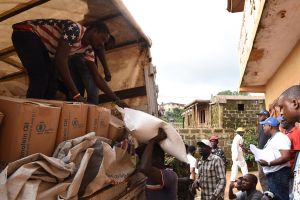WFP begins food distributions to thousands hit by mudslides in Sierra Leone
The United Nations World Food Programme (WFP) is distributing food assistance to 7,500 people affected by the massive mudslides and flooding in Sierra Leone that have killed scores of people and left many more homeless and in desperate need of assistance.

Food distribution by WFP and partners in Freetown on 15 August 2017.
Hours after Monday’s mudslides around Freetown, WFP began distributing initial two-week rations of rice, pulses, vegetable oil and salt to the hardest-hit communities of Regent, Sugar Loaf and Mortomeh around the capital. The assistance will be provided to both survivors of the mudslides and households hosting them, as well as rescue workers and mortuary attendants.
The UN has tasked WFP to support and coordinate a joint and effective humanitarian response to ensure food, shelter and other essential assistance is delivered to those who need it as speedily as possible.
“The mudslides have left a path of death and devastation,” said WFP Representative and Country Director Housainou Taal. “Our thoughts and prayers go to the victims and their families. At the same time, we are now focusing on the survivors, so they can recover and move ahead.”
The experience of Sierra Leone’s Ebola outbreak has prepared the humanitarian community to offer a swift, joint response to this current emergency. Beyond delivering food assistance, WFP is working closely with the government and other partners in search and rescue efforts, notably by providing logistics, geo-spatial mapping of disaster areas and other support.
“We can only hope the rains and flash floods will subside, so the current emergency does not turn into a larger catastrophe,” Taal said.
WFP has been working in Sierra Leone since 1968. Our food and nutritional assistance helps more than 800,000 people to build resilience and supports some of the country’s most vulnerable residents, including Ebola orphans and survivors, people living with HIV and tuberculosis, and smallholder farmers.
Source:World Food Programme
- 241 reads
Human Rights
Ringing FOWPAL’s Peace Bell for the World:Nobel Peace Prize Laureates’ Visions and Actions

Protecting the World’s Cultural Diversity for a Sustainable Future

The Peace Bell Resonates at the 27th Eurasian Economic Summit

Declaration of World Day of the Power of Hope Endorsed by People in 158 Nations

Puppet Show I International Friendship Day 2020

